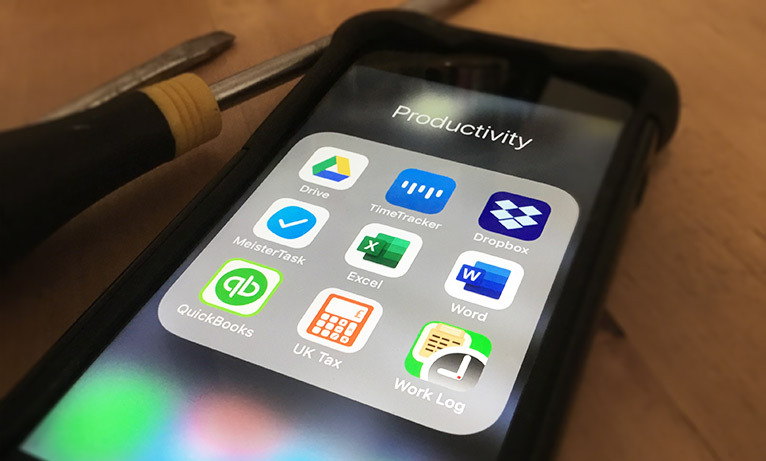Tipped for success: 5 learnings for one-person businesses
If you’re self-employed, run a small company or own a one-person business, you have to take on multiple roles to make sure everything runs smoothly. From doing tax returns to attracting new customers through marketing, you become a master of all trades!
To help lighten the load, here are some of the tools, tips and tricks that enable small businesses to thrive. Implement these into your business’ plans and processes if you haven’t already, to set yourself up for success.
Use apps

You may often find yourself working on the go. There are thousands of mobile apps that will not only allow you to do this, but that will also streamline the way you complete your tasks.
For example, a task manager app on your smartphone will help you to focus on the most important jobs of the day, whilst accounting apps will help you to keep track of your daily expenses – this is especially useful for maintaining compliance with the government’s compulsory Making Tax Digital service.
Other types of app that you may want to check out include:
- Office software apps, such as Microsoft 365 for Microsoft Word or Excel.
- Cloud storage apps, like Google Drive, iCloud and Dropbox, which allow you to store your documents in secure online data centres which can be accessed from anywhere.
- Time tracking apps, to identify how you’re spending your time – some break down where you spend your time by website/app, whereas others send you notifications if you spend too much time on one activity.
Automate admin
Did you know that micro businesses spend ten weeks just on financial admin every year, according to research by Starling Bank?
If you’re currently taking the traditional paper invoice route, you may want to consider moving to an online invoicing system. ‘E-invoicing’ speeds up the whole process, allows you to track the payment status and creates a secure audit trail – meaning you won’t have to search through piles of paperwork to sort out your tax return. It’s better for the environment, too! Check out our 5 simple tips for speedier invoicing for more helpful suggestions that are perfect for a one-person business.

It’s also useful to keep a balance sheet (a financial statement of your assets, liabilities and capital) and have a profit and loss account (a financial statement summarising your revenues, costs and expenses).
There are more tools to help you save time on other areas of admin. With a Rated People account, you’ll have access to our Lead Tracker feature. It’s your one-stop-shop which organises your work, allowing you to see all the details of your customer job leads at a glance, as well as showing you how much value each lead is bringing in.
Strengthen your stock

In the peak of the coronavirus (or COVID-19) lockdown, lots of builders’ merchants were either closed completely, or only offering online orders (if you could get a slot!). So, it’s a good idea to stock up on the key materials that you wouldn’t be able to work without, especially with demand for home improvement work currently increasing.
There’s no need to overstock on everything, though. As a one-person business, you’ll likely have a tight monthly budget, so don’t tie up your cash in excess inventory.
You can keep track of how much stock you’ve got available by creating a simple inventory spreadsheet. Create a table which shows how much you’ve got of each product, then set up a reminder on your phone to check your stock levels every couple of weeks or months (how often depends on how large your inventory is). This will help you to recognise when you need to top up certain products or equipment before you go right down to the wire.
Find out which builders’ merchants are open to tradespeople on our Trade Advice Centre.
Find your USP

A unique selling proposition (USP) is a feature of your one-person business that makes it better than the competition. For example, Nike’s USP is that it offers the best shoes for athletes and people who want to excel in fitness.
Now that lockdown’s easing, thousands of people are searching for tradespeople to complete jobs in their homes each week.
Once you have your USP, you’ll become more confident and focused on delivering the service that these potential customers need and want. It will also help you to attract new customers, as they’ll know exactly what you can offer them and why they should work with you.
You can find your USP by:
1. Comparing yourself to your competitors
Start off by listing the features and benefits of your service or product. Then, identify the aspects of your service or product that your competitors can’t easily copy. Next, you should identify the features of your business that you want to improve.
For example, if you’re a decorator who creates bespoke murals, that’s something that could be unique to your business. However, if you know that this makes your product more expensive than your competitors’, then you won’t want to focus on price in your USP.
2. Putting yourself in your customer’s shoes
Apart from your product or service, think about what your customer is looking for from your business. This could be reliability, good customer service or convenience, for example.
3. Translating your USP into a short phrase
Once you’ve identified your key benefits and your customers’ needs, you can create a short sentence to summarise them.
An example of a USP:
Made-to-order, creative murals that are handcrafted by a family run decorating business – for homeowners that want more than your regular paint job.
You can share your USP on your social media platforms, website and directories. If you have a Rated People account, then it’s a good idea to include your USP in your company description – it’s one of the first things a potential customer will see! Find out how to update this section of your profile in our ‘Update your Rated People profile’ video.
Maintain your mental health

Lots of one-person business owners have been working overtime to make sure that their businesses can survive the coronavirus pandemic. However, it’s important that you also focus on taking care of your mental health. As well as being essential for your own wellbeing, it will help you to be better prepared to face any business challenges.
The Federation of Small Businesses and the Self-Employed (FSB) suggests that you stay connected:
- With other small businesses – The self-employed and small businesses are in the same boat at the moment. You can exchange ideas with them, and they could have creative ideas to grow your business that you haven’t yet thought of.
- With associations that can help – Industry associations, such as the National Federation of Builders, offer advice and support. Some of these have groups that you can join to connect with similar businesses.
It’s also important that you know how to disconnect from work. Set up a dedicated workspace that you can sit down at to complete your admin tasks – even if it’s just a table in your living room. This will help you to separate home from work, as you’ll be able to move away from your workspace when the workday’s over. If you find that the current news makes you feel anxious, try taking regular breaks from news platforms or social media too.
For more information on government grants, loans and other support for the self-employed and small businesses affected by COVID-19, visit the Rated People Trade Advice Centre.




One Comment